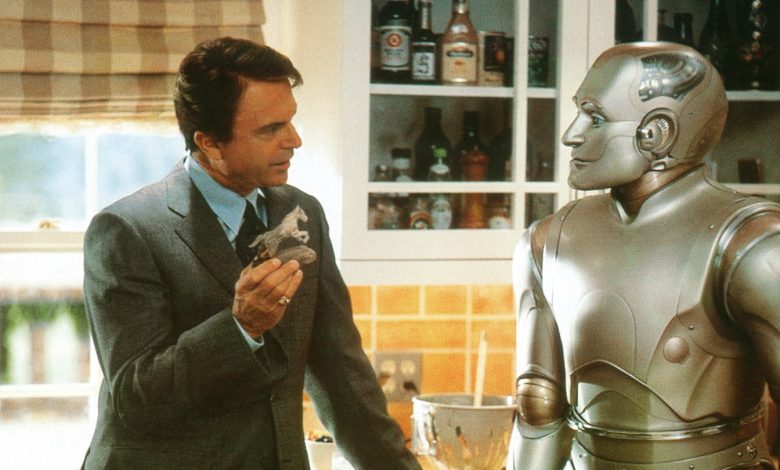‘Bicentennial Man’: THR’s 1999 Review

On December 17, 1999, Touchstone Pictures unveiled the Chris Columbus-Robin Williams sci-fi drama Bicentennial Man in theaters. The divisive film, based on an Isaac Asimov short story, went on to gross $87 million globally and earned an Oscar nomination for makeup and hairstyling. The Hollywood Reporter’s original review is below.
Bicentennial Man is a reverse twist on the Frankenstein story in which the creature — in this case, a robot — is determined to make itself into a human being. The movie is therefore meant to celebrate the glories of being human. But it succeeds in the opposite direction, for the human beings who populate this movie seem positively robotic, and nothing about their existence is made to feel the least bit magical.
Robin Williams, who apparently has taken a vow of comic chastity since winning his Good Will Hunting Oscar, plays the robot who wants to be a man. He carries enough boxoffice oomph to guarantee a solid week or so. But a movie that falls between pop science fiction and dreary social commentary is almost certain to disappoint his old fans and create narcolepsy among those who admire his “serious” acting.
There are many problems with this movie, but none greater than the lack of any real conflict in more than 200 years in the life of a robot named Andrew and the wealthy San Francisco family that owns him but thinks of him as a family member, little drama enters any of their lives.
Nothing ever impedes Andrew’s upgrade to human status. He and later Oliver Platt, playing an eccentric robotics scientist, work out greater and greater innovations that transform Andrew from a mechanical to a biological being. Mean while, Embeth Davidtz continues to swap wigs and bad makeup jobs to indicate the succeeding generations of women in the household, all of whom have a peculiar affinity for this “household appliance.”
Working from a short story by Isaac Asimov and the novel The Positronic Man, by Asimov and Robert Silverberg, Nicholas Kazan has concocted a surprisingly mechanical screenplay that marches through the decades toward a foregone conclusion without any sense of fun or inventiveness about the future.
As Williams’ robot becomes increasingly human, the world around him grows increasingly drab. It’s shocking how regressive the future looks in the insipid production and costume design. In the early 21st century, it appears that Haight-Ashbury fashions have been revived. Later, the urban landscapes, as imagined by legions of matte artists come right out of Fritz Lang’s 1926 Metropolis.
Bicentennial Man is desperate to be a feel-good movie, but it can’t quite locate the buttons to push. There’s a dog Andrew takes in during a storm. A wooden toy Andrew makes for the family’s youngest child. Heartfelt conversation between the robot and the various women in the household on the nature of love. And cutesy touches such as Andrew, about a century into his existence in human culture, still saying “fecal matter” rather than “shit.”
Bicentennial Man‘s credits list seven producers, but no one apparently asked the basic question of “What kind of movie do we want to make?” The film certainly doesn’t work as science fiction. The romance is half-hearted. And director Chris Columbus, known mostly for comedies, seemingly goes out of his way to avoid laughs.
Why is everyone involved in this movie so determined to take such a corny premise seriously? There was a tun, boisterous movie lurking inside Bicentennial Man. Instead we get sentimental fecal matter. — Kirk Honeycutt, originally published on Dec. 10, 1999.
Source: Hollywoodreporter
Related Posts
- Roundball Rocked: With NBA Return Looming, NBC Purges Scripted Roster
- SoundCloud Says It “Has Never Used Artist Content to Train AI Models” After Backlash on Terms of Service Change
- Fox News’ Camryn Kinsey Is “Doing Well” After Fainting on Live TV
- Kerry Washington and Jahleel Kamera in 'Shadow Force.'
Courtesy of Lionsgate
…
- This Alternative Artist Landed a Top-20 Chart Debut With an Album Made Almost Entirely on His Phone





